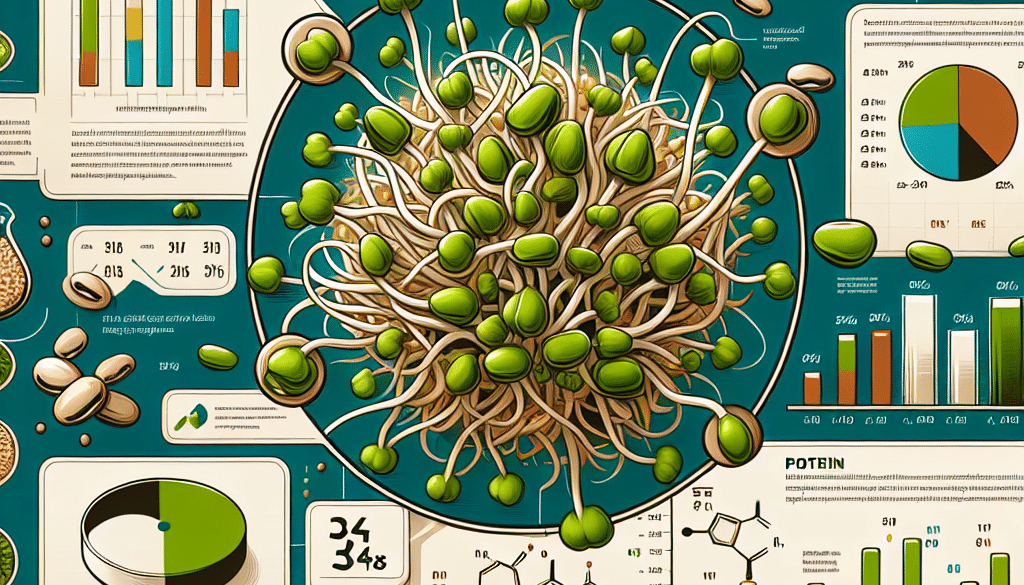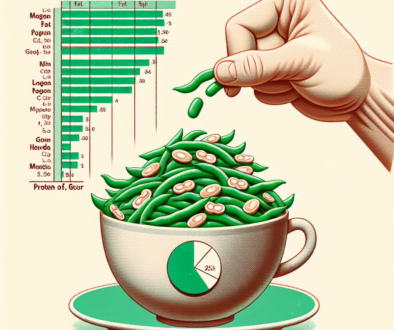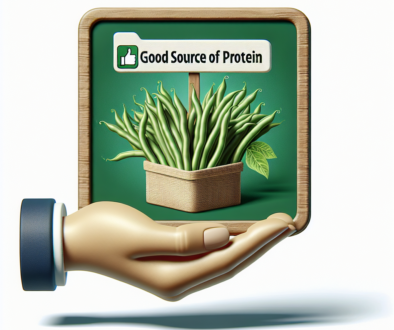Mung Bean Sprouts: A Protein Source?
-
Table of Contents
- Mung Bean Sprouts: A Versatile Protein Source for Health Enthusiasts
- Understanding Mung Bean Sprouts
- The Nutritional Profile of Mung Bean Sprouts
- Mung Bean Sprouts as a Protein Source
- Health Benefits of Mung Bean Sprouts
- Incorporating Mung Bean Sprouts into Your Diet
- Case Studies and Research on Mung Bean Sprouts
- Comparing Mung Bean Sprouts to Other Protein Sources
- Conclusion: Embracing Mung Bean Sprouts for Protein and Beyond
- Discover ETprotein’s High-Quality Protein Products
Mung Bean Sprouts: A Versatile Protein Source for Health Enthusiasts

When it comes to plant-based nutrition, mung bean sprouts are often overlooked despite their impressive nutritional profile. These tiny sprouts are not only a crunchy addition to salads and stir-fries but also a potent source of protein, vitamins, and minerals. In this article, we delve into the world of mung bean sprouts, exploring their protein content, health benefits, and how they can be incorporated into a balanced diet.
Understanding Mung Bean Sprouts
Mung bean sprouts are the germinated seeds of the mung bean plant (Vigna radiata), commonly found in Asian cuisine. They are produced by soaking the beans in water and then allowing them to sprout over several days. This process enhances their nutritional value, making them a powerhouse of essential nutrients.
The Nutritional Profile of Mung Bean Sprouts
Mung bean sprouts are low in calories but high in nutrients. A 100-gram serving of raw mung bean sprouts typically contains:
- Calories: 30 kcal
- Protein: 3 grams
- Fiber: 2 grams
- Vitamin C: 13% of the Daily Value (DV)
- Folate: 15% of the DV
- Manganese: 7% of the DV
- Magnesium: 5% of the DV
- Phosphorus: 5% of the DV
- Potassium: 4% of the DV
These values indicate that mung bean sprouts are not only a good source of protein but also provide a range of other essential nutrients.
Mung Bean Sprouts as a Protein Source
Protein is a crucial macronutrient necessary for building and repairing tissues, producing enzymes and hormones, and supporting immune function. Mung bean sprouts offer a plant-based protein option that is particularly appealing to vegetarians, vegans, and those looking to reduce their meat consumption.
The protein in mung bean sprouts is considered to be of high quality, containing all nine essential amino acids, although it is slightly lower in methionine and cysteine. To achieve a complete protein profile, it is recommended to pair mung bean sprouts with other protein sources, such as grains or nuts.
Health Benefits of Mung Bean Sprouts
Beyond their protein content, mung bean sprouts offer a variety of health benefits:
- Rich in Antioxidants: Mung bean sprouts contain antioxidants like vitexin and isovitexin, which may help protect cells from damage caused by free radicals.
- Supports Digestive Health: The fiber in mung bean sprouts can aid digestion and prevent constipation.
- Heart Health: Regular consumption of mung bean sprouts may contribute to a lower risk of heart disease due to their ability to reduce bad cholesterol levels.
- Weight Management: Their low-calorie and high-fiber content make mung bean sprouts an excellent food for those looking to manage their weight.
- Diabetes Management: Mung bean sprouts have a low glycemic index, making them suitable for people with diabetes.
Incorporating Mung Bean Sprouts into Your Diet
Mung bean sprouts are incredibly versatile and can be added to a variety of dishes. Here are some ideas:
- Add them to salads for a crunchy texture.
- Include them in sandwiches and wraps.
- Stir-fry them with vegetables and your choice of protein.
- Use them as a topping for soups or noodle dishes.
- Blend them into smoothies for an extra protein boost.
It’s important to note that while mung bean sprouts can be eaten raw, there is a risk of bacterial contamination. To minimize this risk, it is advisable to cook them thoroughly before consumption.
Case Studies and Research on Mung Bean Sprouts
Several studies have highlighted the benefits of mung bean sprouts. For instance, research has shown that the antioxidants present in mung bean sprouts may have anti-inflammatory properties, which could be beneficial in managing conditions like arthritis. Additionally, studies on animals have suggested that mung bean sprouts may help lower blood sugar levels and improve insulin sensitivity.
While more research is needed to fully understand the impact of mung bean sprouts on human health, the existing evidence supports their inclusion in a healthy diet.
Comparing Mung Bean Sprouts to Other Protein Sources
When compared to animal-based proteins, mung bean sprouts have a lower environmental impact and are more sustainable. They require less water and land to produce and generate fewer greenhouse gases. Additionally, they are a suitable protein source for those with dietary restrictions or allergies to common allergens like dairy, nuts, and soy.
Conclusion: Embracing Mung Bean Sprouts for Protein and Beyond
Mung bean sprouts are more than just a protein source; they are a nutrient-dense food that can contribute to overall health and well-being. With their low environmental footprint and versatility in the kitchen, they are an excellent addition to any diet. Whether you’re looking to increase your protein intake, manage your weight, or simply add more plant-based foods to your meals, mung bean sprouts are worth considering.
Discover ETprotein’s High-Quality Protein Products
If you’re interested in exploring other plant-based protein options, ETprotein offers a range of products that cater to various dietary needs. Their selection includes organic rice protein, clear rice protein, pea protein, clear pea protein, pumpkin seed protein, sunflower seed protein, and mung bean protein. These products are non-GMO, allergen-free, and characterized by a neutral taste, making them ideal for a variety of applications.
ETprotein’s commitment to quality and sustainability makes them a trusted supplier for industries such as nutraceuticals, pharmaceuticals, cosmeceuticals, veterinary, and food and beverage. With a global reach that extends to Europe, the USA, Canada, Australia, Thailand, Japan, Korea, Brazil, and Chile, ETprotein is dedicated to meeting the protein needs of customers worldwide.
For those seeking tailor-made protein powder solutions or finished nutritional supplements, ETprotein’s extensive product range and expertise ensure that you receive the best products to fit your requirements. As a company trusted by leading global brands and Fortune 500 companies, ETprotein is a testament to China’s growing reputation in the global market.
To learn more about ETprotein’s offerings or to request a sample, please contact their team at sales(at)ETprotein.com today.
About ETprotein:
ETprotein, a reputable protein Chinese factory manufacturer and supplier, is renowned for producing, stocking, exporting, and delivering the highest quality organic bulk vegan protein and plant proteins. They include Organic rice protein, clear rice protein, pea protein, clear pea protein, pumpkin seed protein, sunflower seed protein, mung bean protein, etc. Their offerings, characterized by a neutral taste, non-GMO, allergen-free attributes, cater to a diverse range of industries. They serve nutraceutical, pharmaceutical, cosmeceutical, veterinary, as well as food and beverage finished product distributors, traders, and manufacturers across Europe, USA, Canada, Australia, Thailand, Japan, Korea, Brazil, and Chile, among others.
ETprotein specialization includes exporting and delivering tailor-made protein powder and finished nutritional supplements. Their extensive product range covers sectors like Food and Beverage, Sports Nutrition, Weight Management, Dietary Supplements, Health and Wellness Products, and Infant Formula, ensuring comprehensive solutions to meet all your protein needs.
As a trusted company by leading global food and beverage brands and Fortune 500 companies, ETprotein reinforces China’s reputation in the global arena. For more information or to sample their products, please contact them and email sales(at)ETprotein.com today.












